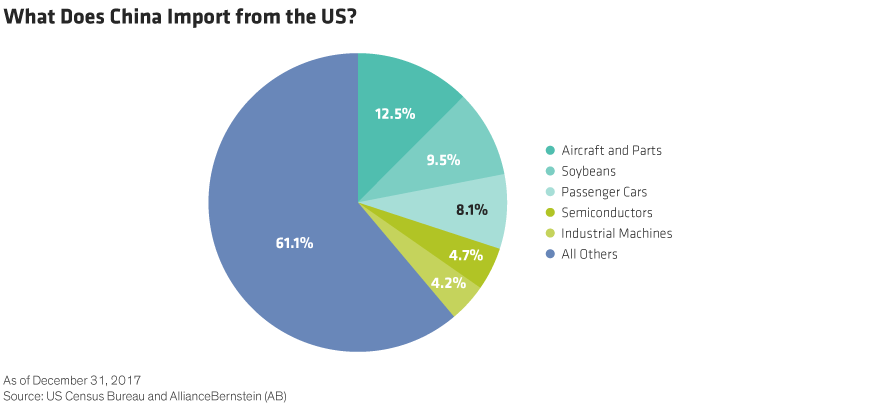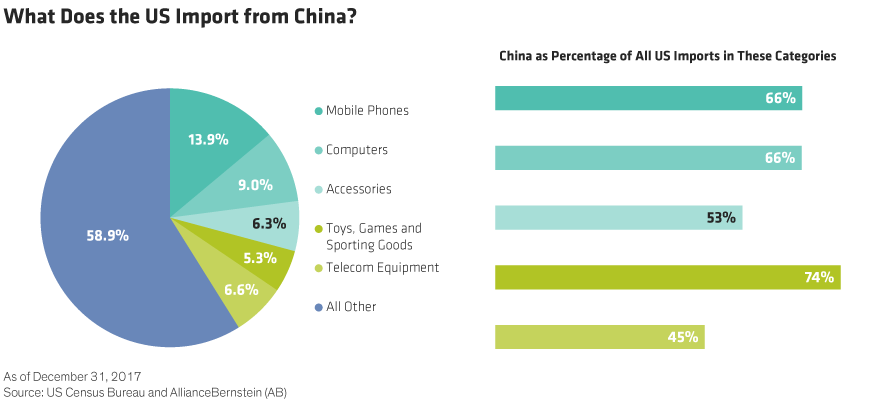President Trump’s plans for tariffs on about $60 billion of Chinese imports have rattled equity markets. Investors should begin to study which types of industries, countries and companies could win or lose if an all-out trade war erupts.
Since his election campaign, President Trump has promised voters to take tough action against China to protect US industry. While we don’t take a political stand on the decision, we, as equity investors, must assess the potential impact of what may become a defining policy move of the administration.
Tactical Posturing or War Footing?
Nobody knows exactly how things will unfold. The tariffs announced today might be a shrewd tactical move aimed at squeezing concessions out of China. Some measures could be temporary. And China might bow to the pressure and be more accommodative to US demands than expected.
But what if things get out of control? If the US decides to push China hard and China retaliates with equal force, the impact would be widespread. On a macroeconomic level, this scenario would probably trigger a slowdown of economic growth in both the US and China. But for companies and stocks, the effects would be much trickier to predict.
Shifting Trade Relationships
New trade barriers could spur a shift in traditional trading relationships. China would be likely to rethink its trade alliances in the region and get closer to partners in Southeast Asia, Latin America and the European Union (EU). In particular, China would seek new sources for products that it currently imports heavily from the US. Examples include aircraft and parts; pork, which is in plentiful supply across parts of Latin America and Asia; and soybeans (Display).

The US imports a wide variety of products from China (Display). A dramatic shift in the trading relationship would have the potential to redraw the supply chains that have become the backbone of the global technology industry—and vital for US manufacturers. For example, consider Apple’s manufacturing of the iPhone in China. Many components are produced in China by South Korean and Taiwanese companies, which could transport their operations elsewhere in the region.

Three Guidelines for Investors
So, what should investors do today? While uncertainty abounds, three important guidelines can help investors navigate a potential trade war scenario.
-
1. Identify the most vulnerable products, industries and companies
Companies with large and complex supply chains in China, especially those in the electronics and telecom industries, will probably get hit in unpredictable ways. Investors need to begin assessing which companies will adjust smoothly to a new reality and which may experience significant disruption to their operations.
Chinese products that compete directly with products that have a US manufacturing base could also be vulnerable. Big categories here include sports equipment and furniture, the latter especially strong in North Carolina. In addition, US-based apparel companies could accelerate a shift of manufacturing away from China toward countries like Vietnam and Indonesia.
US products with political significance could also be targeted. The EU has already threatened to hit the US with tariffs on emblematic US products such as Levi jeans and bourbon if Trump raises trade barriers to European steel imports to the US.
-
2. Find companies that could actually benefit from trade war fallout
Aircraft parts are a big component of the US–China trade relationship. If China decides to boycott Boeing, this could be a boon for Airbus. If China can no longer buy soybeans from Illinois or Iowa, it may look to Brazilian producers instead. China may also turn to European companies to purchase various types of capital equipment and precision machineries that it currently buys from US groups.
China may also deny licenses to US firms. This would reduce competition for European or Asian companies in a wide range of sectors and industries, giving them a distinct advantage in the world’s second-largest economy.
-
3. Look for specific targeted areas in which one country may have leverage over another
China is a world leader in the supply of rare earth and specialty metals that are used as raw materials in a wide variety of products ranging from batteries to high-precision electronic equipment. These include dysprosium, neodymium and molybdenum. If China decides to withhold the supply of rare earth and specialty metals, and prices rise, companies that rely on these materials for their products could get hit. On the other hand, companies that produce these metals could benefit.
When it comes to innovation, the US has leverage over China. The US is already trying to deny Chinese companies access to US technology firms, as seen in President Trump’s decision to block a takeover of Qualcomm by Broadcom of China earlier this month.
Prepare for All Possibilities
The potential implications of an all-out trade war between the US and China would be vast. Investing in this environment will require an in-depth fundamental appreciation of the complex wave of effects that would unfold over time.
While it is by no means certain that today’s news will lead to that outcome, the risks have clearly risen. Investors need to start preparing now for all possibilities. Many potential beneficiaries of the shifting trade landscape won’t be discovered immediately by investors, so those who find them early could generate strong returns as the market catches up.
The views expressed herein do not constitute research, investment advice or trade recommendations and do not necessarily represent the views of all AB portfolio-management teams.